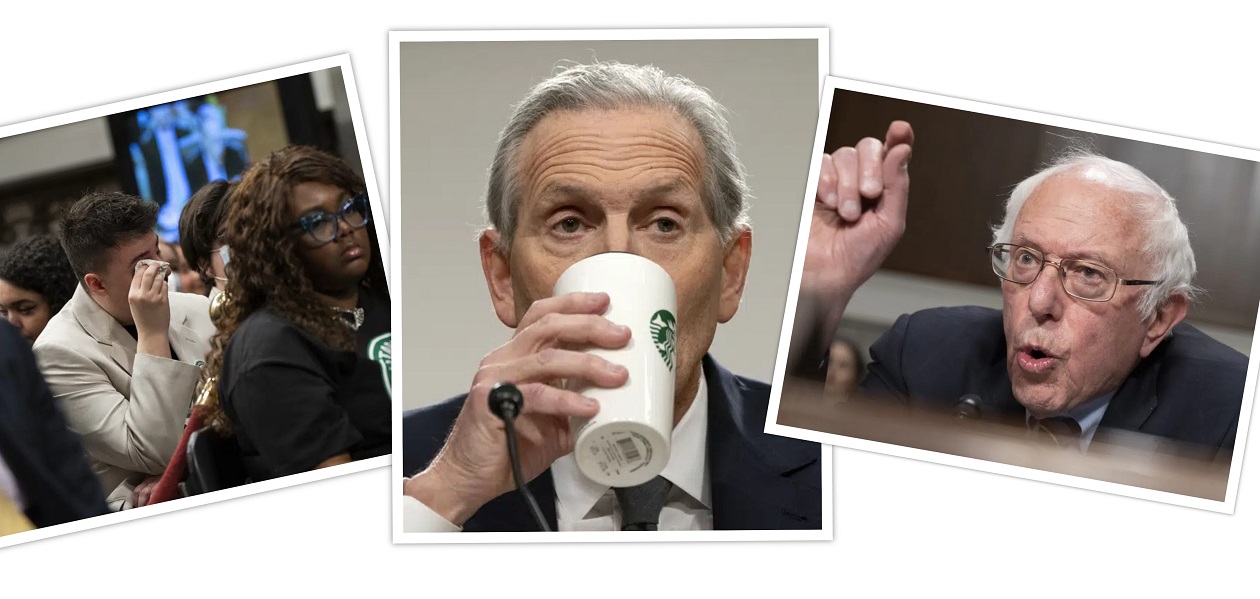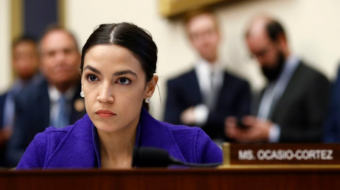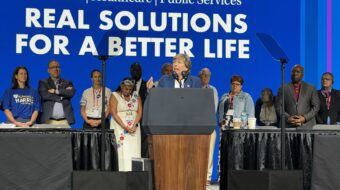
WASHINGTON—In an often-contentious 4-1/2-hour Senate hearing, Starbucks founder Howard Schultz denied, ducked and stonewalled workers’ reports and National Labor Relations Board findings of the monster coffee chain’s constant, centrally-controlled and nationwide labor law-breaking.
Senate Labor Committee Chairman Bernie Sanders, Ind-Vt., led off the March 29 session by declaring of Schultz that “Even if he’s a multimillionaire, he’s not entitled to break the law.”
Things went downhill from there when Schultz was in the witness chair.
Whenever Sanders and other committee Democrats, using worker statements and evidence unearthed by the NLRB in a 218-page order banning Starbucks’s constant labor law-breaking in Buffalo and nationwide, tried to get the ex-CEO to promise to obey the law—or at least come to the bargaining table with workers of the 300 Starbucks stores who have unionized so far—he refused.
Instead, Schultz claimed his team scheduled 85 face-to-face meetings with workers at individual stores. But when workers elsewhere zoomed in, his bargainers left. Wrapping himself in privacy concerns, Schultz claimed they did so because the sessions could divulge personal information.
One late witness, after Schultz finished, former NLRB member and veteran labor lawyer Sharon Block, put the Starbucks unionization campaign, and the company’s reaction, into a national context, and not just one of fed-up low-wage workers unionizing for protection, recognition and financial improvements.
Those are all true. But Block added that in her decades of writing labor law as a congressional staffer, enforcing it at the NLRB and now teaching it at Harvard, she has never seen such widespread defiance by any company. And if Starbucks gets away with it, she warned, other firms will be even more emboldened to resist, defy and break labor law against workers.
Before that, Schultz kept denying every single labor-law breaking charge thrown at him by the workers and the NLRB. So far, there are more than 500 charges, formally called unfair labor practices. And Schultz kept returning to Starbucks’s supposed reputation as a caring company. The Starbucks workers, testifying later, refuted him.
Operating from the grass roots
The workers, operating from the grass-roots but aided by Starbucks Workers United, have won union recognition votes at more than 300 Starbucks stores nationwide, and triumphed in 83% of all elections. They’ve also had to file more than 1,200 labor law-breaking complaints to the NLRB.
“You cannot be pro-people and anti-union,” Tennessee worker Maggie Carter said.
Carter and Jayson Saxton, an illegally fired worker from Augusta, Ga., testified after Schultz’s 3-1/2 hours in the witness chair. They told quite a different story of company pursuit of profits, low pay, lousy working conditions and severe discipline, all of which and more drove them to unionize.
Now ex-CEO Schultz, who’s worth $3.7 billion and who made $21 million in total compensation last year, dismissed their charges, along with those in the NLRB’s ruling, or denied knowing anything about them. When one Republican asked him how much top Starbucks execs made, he ducked.
Meanwhile, Carter and Saxton brought walking, talking evidence of how Starbucks mistreats its “partners,” as the company calls workers, when they try to unionize to protect and better themselves.
It was a tale of forced captive audience meetings, discrimination in hours and transfers between stores, benefits offered to non-union store workers but denied to those in unionized stores—using labor law as an excuse—minimum wages until last May and no health coverage through an already expensive company policy if you worked fewer than 20 hours a week.
And there were arbitrary cuts in hours, too, Saxton said. In one three-week period, a worker could go from 25 hours—qualifying for coverage—to five hours to 15.
Single mom Carter told senators Starbucks retaliated against her union organizing by holding up her transfer request from Jackson, Tenn., to Knoxville, Tenn., for three months. She had to quit while awaiting a decision, and that denied the health benefits she needed for her child. Carter wanted to transfer to Knoxville so she could go to college part-time.
Pro-union workers “were getting disciplined for minor violations” like dress code variations, she added. When the union won the Jackson vote—its first win in the South—on March 29, 2022, Starbucks retaliated “by walking out after 30 minutes” of their first bargaining session. “And on May 3, they said we wouldn’t get any” benefits that were promised to non-union store workers.
Schultz’s reason, repeated over and over to senators? Labor law, he claimed, bans additional benefits during an organizing drive—even when the union waives its right to contest those increases.
And Starbucks’s “captive audience” meeting in Jackson had an extra twist due to the coronavirus (Covid-19) pandemic. Such meetings, which feature anti-union harangues by bosses, union busters or both—and discipline if you don’t attend—are common.
Worked from Day 1 of pandemic
“I worked—we all worked—from Day 1 of the pandemic” in Jackson, Carter explained. “It was the only one that stayed open” despite the spreading modern-day plague. She was paid $8.35 an hour. This past May, Starbucks raised all baristas to $17.50, an outcome one speaker said was due to the union drive.
“They brought in a manager from outside we had never seen before” for a captive audience meeting, she said. “We weren’t told we didn’t have to attend.” Schultz says Starbucks prefers “direct communication” with workers—a common employer argument.
“This manager gave us Covid. We had to shut the store down for five days.”
Saxton, an illegally fired Starbucks worker from Augusta, Ga., and a partially disabled veteran, said even before the firm canned him for organizing its store there, it cut his hours so much he lost its already costly health insurance. That retaliation meant he had to go back to the local Veterans Administration clinic for his care, but also left his wife and child without coverage.
After the firm fired an Augusta manager for being too sympathetic to the workers, it brought in an anti-union manager “who moved everything around every day. Then she wrote down names” for discipline when disoriented workers couldn’t find the new locations of the machines.
“They were definitely engaging in anti-union activity,” Saxton said.
If Starbucks beats the unionization drive by dragging it through the board and the courts, using its wealth to produce interminable delays to wear down the grass-roots workers and their union backers, Starbucks Workers United, that sends a message to rest of the corporate class, said Block.
“What has happened” at Starbucks “is not just a collection of individual violations. It is a coordinated company campaign that shows the company has the will, the stamina and the resources” to defeat any union organizing drive.
“What will other workers around the country think of when they see Starbucks can do this?”
Her answer: “Workers rights” in the U.S. “are as weak as a Starbucks coffee cup.”
Video of the hearing is at https://www.help.senate.gov/hearings/no-company-is-above-the-law-the-need-to-end-illegal-union-busting-at-starbucks.
We hope you appreciated this article. Before you go, please support great working-class and pro-people journalism by donating to People’s World.
We are not neutral. Our mission is to be a voice for truth, democracy, the environment, and socialism. We believe in people before profits. So, we take sides. Yours!
We are part of the pro-democracy media contesting the vast right-wing media propaganda ecosystem brainwashing tens of millions and putting democracy at risk.
Our journalism is free of corporate influence and paywalls because we are totally reader supported. At People’s World, we believe news and information should be free and accessible to all.
But we need your help. It takes money—a lot of it—to produce and cover unique stories you see in our pages. Only you, our readers and supporters, make this possible. If you enjoy reading People’s World and the stories we bring you, support our work by donating or becoming a monthly sustainer today.












Comments